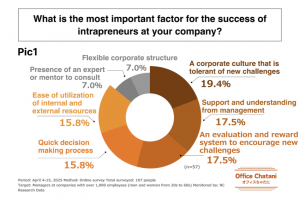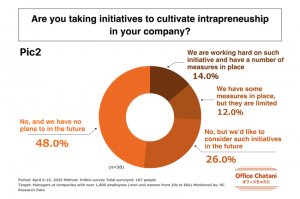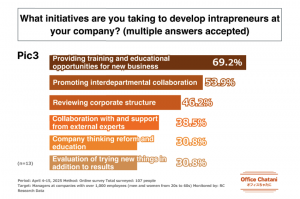Part 2: Creativity Tops the List - Office Chatani Reveals Key Traits of Intrapreneurs in Major Japanese Corporations
TOKYO, JAPAN, July 10, 2025 /EINPresswire.com/ -- Office Chatani, Inc. (CEO: Masayuki Chatani) has announced the results of a survey they conducted on “intrapreneurs” in large companies, targeting those with over 1,000 employees. These results shed light on the actual state of business creation personnel in these companies.
Background
The world is currently in what has been called the VUCA age, where the business world is rapidly changing and uncertainty is growing. As the market and customers' needs change by the second, companies are expected to respond to these needs with flexibility and innovation. Under these circumstances, business creation is an essential initiative to maintain and strengthen a company’s competitive position. On the other hand, due to the scale of resources and complexity of their decision-making process, managers cannot focus solely on the business environment, but must also face challenges such as rigid internal organization and a risk-averse culture while striving to generate new value. Among them, “intrapreneurs,” or one who creates new businesses while working within an organization, have been attracting attention. Large companies have a strong desire for individuals willing to go against the existing business structure and culture and generate new value within the company. To that end, Office Chatani, Inc. conducted a survey targeting managers within large companies regarding intrapreneurship in such companies.
Survey summary
- Among companies with over 1,000 employees, over half of them have personnel who are considered “intrapreneurs”
- The largest age group for “intrapreneurs” is 40-49
- The top three common skills among intrapreneurs are 1. Creativity and Imagination, 2. Business Strategy Acumen, and 3. Autonomy and Independent Action
- Many companies are working on “supporting internal and external personal networking” for the purpose of developing intrapreneurs
- The most important environmental factor for successful intrapreneurship is considered to be “a corporate culture that is tolerant of new challenges”
- Among companies indicating that they did not have any “intrapreneurs,” over 70% were not taking initiatives to cultivate intrapreneurship in their company
- Among companies without “intrapreneurs,” many named “providing training and educational opportunities for new business” as an initiative for cultivating intrapreneurship
- Among companies without “intrapreneurs,” the top three challenges or obstacles for cultivating intrapreneurship were said to be 1. “Lack of a role model in the company”, 2. “Lack of internal resources (time, budget, personnel)”, and 3. “Lack of a system or culture to evaluate challenges.”
Survey overview
Period: April 4-15, 2025
Method: Online survey
Target: Managers at companies with over 1,000 employees (men and women from 20s to 60s)
Total surveyed: 107 people
Monitored by: RC Research Data
This article is a continuation of Part 1.
URL:https://myfox8.com/business/press-releases/ein-presswire/827573911/part-1-creativity-tops-the-list-office-chatani-reveals-key-traits-of-intrapreneurs-in-major-japanese-corporations/
- The most important environmental factor for successful intrapreneurship is considered to be “a corporate culture that is tolerant of new challenges”
Companies who indicated the presence of intrapreneurs at their company were then asked “What is the most important factor for the success of intrapreneurs at your company?”, to which 19.4% said “A corporate culture that is tolerant of new challenges.” In second place, “Support and understanding from management” and “An evaluation and reward system to encourage new challenges” were tied at 17.5%. (Pic1) Based on these results, it was found that many managers consider “a corporate culture that is tolerant of new challenges” to be the most important factor for the success of intrapreneurs.
Among companies indicating that they did not have any “intrapreneurs,” over 70% were not taking initiatives to cultivate intrapreneurship in their company
Next, managers that indicated there were no intrapreneurs at their company were asked “Are you taking initiatives to cultivate intrapreneurship in your company?” 48.0% of respondents answered “No, and we have no plans to in the future,” while 26.0% said “No, but we’d like to consider such initiatives in the future,” 14.0% said “We are working hard on such initiative and have a number of measures in place,” and finally 12.0% responded that “We have some measures in place but they are limited.” (Pic2) Based on these results, it has become clear that over 70% of companies without intrapreneurs are not currently taking initiatives to develop them.
Among companies without “intrapreneurs,” many named “providing training and educational opportunities for new business” as an initiative for cultivating intrapreneurship
Following this, companies that indicated a lack of intrapreneurs while also indicating they were taking initiatives to develop them were asked “What initiatives are you taking to develop intrapreneurs at your company?” The top answers were “Providing training and educational opportunities for new business” at 69.2%, “Promoting interdepartmental collaboration” at 53.9%, and “Reviewing corporate structure” at 46.2%. Based on these results, it can be said that “providing training and educational opportunities for new business” is the most common initiative for cultivating intrapreneurship. (Pic3)
Among companies without “intrapreneurs,” the top three challenges or obstacles for cultivating intrapreneurship were said to be 1. “Lack of a role model in the company”, 2. “Lack of internal resources (time, budget, personnel)”, and 3. “Lack of a system or culture to evaluate challenges.”
Finally, companies that indicated a lack of intrapreneurs while also indicating they were taking initiatives to develop them were asked “What are the challenges and obstacles for cultivating intrapreneurship in your company?” The top answers were “Lack of a role model in the company” with 53.9%, “Lack of internal resources (time, budget, personnel)” with 46.2%, and “Lack of a system or culture to evaluate challenges” with 38.5%. (Pic4) Based on these results, it has been found that many managers find the lack of a role model within the company to be a major challenge.
Summary
Based on this survey, it has been found that the majority of large companies with over 1,000 employees have intrapreneurs within their organization, and the most common age group for these intrapreneurs is 40-49. In addition, the most common shared traits and skills are “creativity and imagination,” “business strategy acumen,” and “autonomy and independent action,” while the most common initiative for companies with these human resources is “supporting internal and external personal networking” and “a corporate culture that is tolerant of new challenges” is considered to be the most important factor for cultivating intrapreneurship. When it comes to companies without intrapreneurs, it was found that over 70% are not taking initiatives to develop intrapreneurs within their company. As for the ones that are taking such initiatives, the most common is “providing training and educational opportunities for new business,” while the biggest hurdles for succeeding in this development are “a lack of a role model in the company”, “a lack of internal resources (time, budget, personnel)”, and “a lack of a system or culture to evaluate challenges.”
These results show that the most common shared traits and skills for intrapreneurs working within an organization are “creativity and imagination,” “business strategy acumen,” and “autonomy and independent action.” Office Chatani, Inc. offers “management support services” to develop “creative human resources.”
Survey conducted by:
Office Chatani, Inc.
Location: Tokyo
CEO: Masayuki Chatani
Description of business: Creative Management Support, Lectures, Writing, etc.
URL: https://www.office-chatani.com
Office Chatani, Inc. supports creative management.
CEO Masayuki Chatani, author of “Behind the Scenes at PlayStation: Former CTO Talks about 16 Years of Creation,” has previously served as CTO and EVP of a global video game business, an executive officer of an internet conglomerate, CEO of a professional firm’s digital group company, the Japan Head of the digital team at a strategic consulting firm, and other positions.
Masayuki Chatani
Office Chatani, Inc.
contact01@office-chatani.com
Legal Disclaimer:
EIN Presswire provides this news content "as is" without warranty of any kind. We do not accept any responsibility or liability for the accuracy, content, images, videos, licenses, completeness, legality, or reliability of the information contained in this article. If you have any complaints or copyright issues related to this article, kindly contact the author above.




